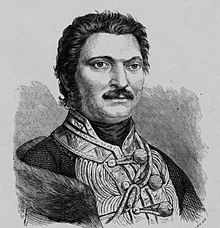| Revision as of 00:30, 11 November 2016 editKIENGIR (talk | contribs)Extended confirmed users, Pending changes reviewers25,154 editsNo edit summary← Previous edit | Revision as of 05:26, 11 November 2016 edit undoDitinili (talk | contribs)Extended confirmed users3,900 edits Undid revision 748891098 by KIENGIR (talk) Request for a mediation about naming is in progress...Next edit → | ||
| Line 6: | Line 6: | ||
| '''János Bihari''' (October 21, 1764 – April 26, 1827) was an influential ] ] ]ist. He is one of the founders of Romani academic music and the musical genre ]. | '''János Bihari''' (October 21, 1764 – April 26, 1827) was an influential ] ] ]ist. He is one of the founders of Romani academic music and the musical genre ]. | ||
| By the middle of the nineteenth century, "Gypsy music" was elevated to high fashion. The first great was that of János Bihari, the virtuoso violinist from ]. ] said of him: "The tones sung by his magic violin flow on our enchanted ears like the tears..." | By the middle of the nineteenth century, "Gypsy music" was elevated to high fashion. The first great was that of János Bihari, the virtuoso violinist from the county of Pressburg (now ], Hungarian Pozsony). ] said of him: "The tones sung by his magic violin flow on our enchanted ears like the tears..." | ||
| ==Biography== | ==Biography== | ||
Revision as of 05:26, 11 November 2016
You can help expand this article with text translated from the corresponding article in Hungarian. (August 2012) Click for important translation instructions.
|
| This biography of a living person needs additional citations for verification. Please help by adding reliable sources. Contentious material about living persons that is unsourced or poorly sourced must be removed immediately from the article and its talk page, especially if potentially libelous. Find sources: "János Bihari" – news · newspapers · books · scholar · JSTOR (August 2012) (Learn how and when to remove this message) |


János Bihari (October 21, 1764 – April 26, 1827) was an influential Hungarian Romani violinist. He is one of the founders of Romani academic music and the musical genre verbunkos.
By the middle of the nineteenth century, "Gypsy music" was elevated to high fashion. The first great was that of János Bihari, the virtuoso violinist from the county of Pressburg (now Bratislava, Hungarian Pozsony). Franz Liszt said of him: "The tones sung by his magic violin flow on our enchanted ears like the tears..."
Biography
Bihari was born into a Romani family in Nagyabony; his father was a violinist. In 1801, living in Pest, Bihari created an orchestra of 1 cimbalist and 4 violinists. This orchestra became popular soon and visited with Bihari many towns in Hungary and abroad. In every country Janos learnt local folk and academic music and arranged it to play during his performances. Bihari was so popular that he could live like a noble man: he had expensive clothes and a servant who held Bihari's violin, he stayed in luxurious hotels, etc. He was also invited to play for the Emperor of Austria.
Bihari's melodies were used by such composers as Franz Liszt, Ludwig van Beethoven, Pablo de Sarasate and others.
In 1824 Bihari injured his left hand, thus impairing his ability to perform. Subsequently, his popularity declined, and he died in poverty in Pest.
Bihari left 84 musical compositions that are considered to be classic.
Cultural Heritage
In Hungary, the Bihari János Táncegyüttes is a Hungarian folklore dancers group named after the famous composer Bihari János.
External links
- Janos Bihari
- Bio in hungarian
- Free scores by János Bihari at the International Music Score Library Project (IMSLP)
This article about a Hungarian musician is a stub. You can help Misplaced Pages by expanding it. |
This article on a violinist or fiddler is a stub. You can help Misplaced Pages by expanding it. |